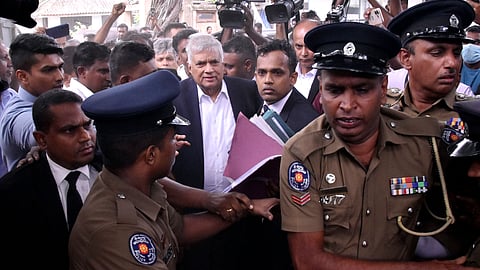Despite Wickremesinghe’s arrest, Sri Lanka’s politics is stuck in its old loop
In a first for Sri Lanka, a former president is under arrest in connection with misuse of state funds. On 22 August, the Colombo Fort Magistrate’s Court ordered the arrest and remand of Ranil Wickremesinghe over allegations that he used public funds on a two-day personal visit to the United Kingdom in September 2023.
The move jolted the country’s political circles. Sri Lanka’s major political leaders appeared at the court in a show of support for Wickremesinghe, including the former president Maithripala Sirisena as well as the parliamentarian Namal Rajapaksa, the son and heir apparent of former president Mahinda Rajapaksa. Another former president, Chandrika Bandaranaike Kumaratunga, also chimed in, stating that the arrest was a serious threat to democracy. Sajith Premadasa, presently the leader of the opposition and head of the Samagi Jana Balawegaya (SJB), visited Wickremesinghe at the prison hospital where he was admitted soon after his arrest, as did former president Mahinda Rajapaksa.
Premadasa and Sirisena have long had public run-ins with Wickremesinghe. Premadasa’s split from Wickremesinghe’s United National Party (UNP) badly weakened the once-grand outfit, and Sirisena − who once governed with Wickremesinghe − famously removed Wickremesinghe as prime minister in Sri Lanka’s 2018 constitutional coup, replacing him with his arch rival (at the time, at least), Mahinda Rajapaksa. Yet Rajapaksa and his Sri Lankan Podujana Peramuna (SLPP) backed Wickremesinghe when Sri Lanka’s parliament − not the electorate − elected him executive president in 2022, soon after Mahinda’s brother Gotabaya was forced to flee the country after mass protests amid a calamitous economic crisis.
Now, the entire old guard – Premadasa, Mahinda Rajapaksa, Sirisena, Bandaranaike and others – have voiced support for Wickremesinghe. A couple of days after the arrest, opposition forces united against the government led by president Anura Kumara Dissanayake under the motto “Let’s defeat the constitutional dictatorship,” with current and former parliamentarians expressing solidarity with Wickremesinghe.
Sri Lanka’s politics has created strange bedfellows. Yet Sri Lankans, who have witnessed their leaders’ opportunistic makeups and breakups over the years, know the bed they share. It is a bed that expands and contracts as needed, that sees its sheets swapped at election time – yet the frame endures.
While the courts decide the legitimacy of Wickremesinghe’s arrest, all eyes are on the choreography of solidarity that has followed. The scenario evokes a popular maxim favoured by both Sirisena and Wickremesinghe: in politics, there are no permanent friends or enemies. This is especially so in Sri Lanka’s dynastic, nepotistic political tradition.
The closing of the varied ranks of the present opposition – against a government with a two-thirds parliamentary majority, led by the leftist Janatha Vimukthi Peramuna (JVP) and elected in the wake of the 2022 economic crisis by an electorate livid at the old establishment – is almost instinctive. Each player is calculating how to use the moment to personal advantage or for self-preservation; each still nurses ambitions of returning to power, including Mahinda Rajapaksa and his many family members.
Many of them downplay the allegations against Wickremesinghe – the use of LKR 16.6 million (roughly USD 53,000 at the time) to cover expenses for a ten-member delegation including Wickremesinghe, his wife and security detail on a personal visit – as trivial. But this was not trivial for a country that was then and is still recovering from bankruptcy, with millions struggling to put food on the table. There is a quiet fear running through Sri Lanka's political class, many of whom have been accused of misusing state funds or flouting the law in the past, but have never faced legal consequences, that the wheels of justice could grind them down next.

